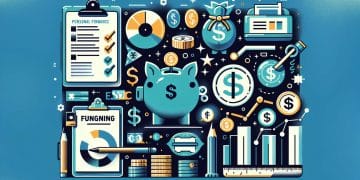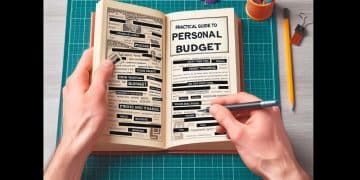Achieve Financial Freedom Through Effective Personal Budgeting


Mastering Personal Budgeting: A Path to Financial Freedom
In today’s fast-paced world, achieving financial stability is a goal that resonates with many. Personal budgeting stands as a crucial skill that paves the way to financial freedom. Whether you’re looking to escape debt or invest judiciously, a well-structured budget acts as a roadmap toward achieving your financial aspirations. Despite its significance, budgeting often intimidates people, evoking a sense of apprehension. However, with the right approach, budgeting transforms into an empowering, manageable process.
Anúncios
Personal budgeting is vital as it equips individuals with essential insights into their financial habits. It ensures that essentials are covered while allowing room for savings and entertainment. Budgeting instills a sense of control over your finances, preventing money from dictating terms to you. By adopting effective budgeting techniques, financial health can be maintained, eliminating the threat of overspending and financial insecurity.
In this article, we delve into the significance of personal budgeting and provide practical tips to set you on a path of financial health and success. Mastering personal budgeting is not just about curbing expenses but involves understanding income, expenses, and setting clear financial goals. Let’s explore the essential steps and strategies to create a budget tailored to your needs, allowing you to attain financial freedom.
Overview: Steps to Effective Personal Budgeting
Creating a personal budget involves several crucial steps to ensure a comprehensive understanding of your financial situation. The first step is evaluating your income. Identify all sources of income and focus on your net income, as this represents the real amount you can work with. Knowing your financial inflow sets the stage for the subsequent steps.
The next step is listing and categorizing your expenses. Fixed expenses cover necessities like rent and utilities, while variable expenses involve optional spending like dining out. It’s important to have a clear picture of where your money goes to manage it effectively. Setting financial goals follows, where you identify short-term and long-term objectives to guide your budgeting decisions.
Once goals are set, it’s time to design your budget. Ensure your expenses don’t exceed your income by cutting unnecessary spending or finding ways to increase income. Utilizing budgeting tools like spreadsheets or budgeting apps can help you stay on track. Regularly reviewing and adjusting your budget is crucial to accommodate changes in income or unexpected expenses.
Acknowledging and avoiding common budgeting pitfalls is vital for success. Failing to account for irregular expenses, setting unrealistically high goals, neglecting budget updates, and overlooking small expenses can derail your efforts. Being aware of these mistakes allows you to navigate around them.
Practical tips for sticking to a budget include automating savings, using cash for discretionary spending, staying motivated, and finding a budgeting buddy for accountability. These techniques can reinforce discipline and commitment to financial goals.
Characteristics and Essential Tips for Budgeting
- Evaluate your total net income.
- List fixed and variable expenses.
- Set realistic short-term and long-term financial goals.
- Create a flexible budget plan utilizing tools or apps.
- Review and adjust your budget regularly to adapt to changes.
- Avoid common pitfalls like ignoring small expenses and failing to update.
- Utilize practical strategies like automating savings and using cash.
Benefits of Personal Budgeting
Embracing personal budgeting comes with a myriad of benefits that can positively impact both your financial and personal life. Budgeting not only provides control over finances but also reduces stress associated with money management. By having a clear plan, financial decisions become more straightforward, leading to a healthier financial lifestyle.
One major benefit is the effective management of debt. A budget allows for systematic debt repayment, prioritizing high-interest debts and creating a timeline for becoming debt-free. This approach not only minimizes interest paid over time but also enhances savings potential.
Budgeting also facilitates savings growth by allocating a portion of income towards savings goals. Whether it’s for emergencies, retirement, or specific desires like a new home, budgeting ensures consistent contributions to savings, securing future financial stability.
Financial planning for big purchases becomes less stressful with budgeting. By planning ahead, you can allocate resources and save over time, minimizing financial strain when making significant purchases. This approach fosters a sense of accomplishment, making large purchases more rewarding.
Ultimately, personal budgeting fosters a sense of security and confidence in financial futures. With disciplined budgeting, long-term goals such as homeownership, education, and retirement become attainable, bringing peace of mind regarding one’s financial outlook.
Key Benefits of Personal Budgeting
- Financial control and reduced stress.
- Systematic debt management and repayment.
- Enhanced savings growth for future goals.
- Planning reduces stress associated with significant purchases.
- Long-term financial security and confidence.
In conclusion, mastering personal budgeting is an essential skill that can lead to financial freedom. Through structured planning and disciplined habits, budgeting becomes not just a necessity but a strategic partner in achieving financial goals. Understanding your financial landscape, setting attainable goals, and utilizing effective tools empowers you to manage finances successfully. Embrace budgeting to unlock a path of financial stability, peace of mind, and a secure future.
By adopting the steps and avoiding common pitfalls discussed, personal budgeting can be a straightforward process. Keep in mind that flexibility and regular reviews are crucial to accommodate life’s unpredictability, ensuring alignment with your long-term aspirations.
The role of mindset is equally important in budgeting success, as viewing budgeting positively encourages a proactive approach. Celebrate small victories along the way as you witness progress towards financial freedom. With commitment, budgeting transforms from an intimidating chore into an empowering ally in your financial journey.
Begin your budgeting journey today with clarity and determination. Embrace the process, uphold financial health, and lay the foundations for a prosperous future. Mastering personal budgeting is not only the map to success but a lifestyle choice that supports lasting financial well-being.





